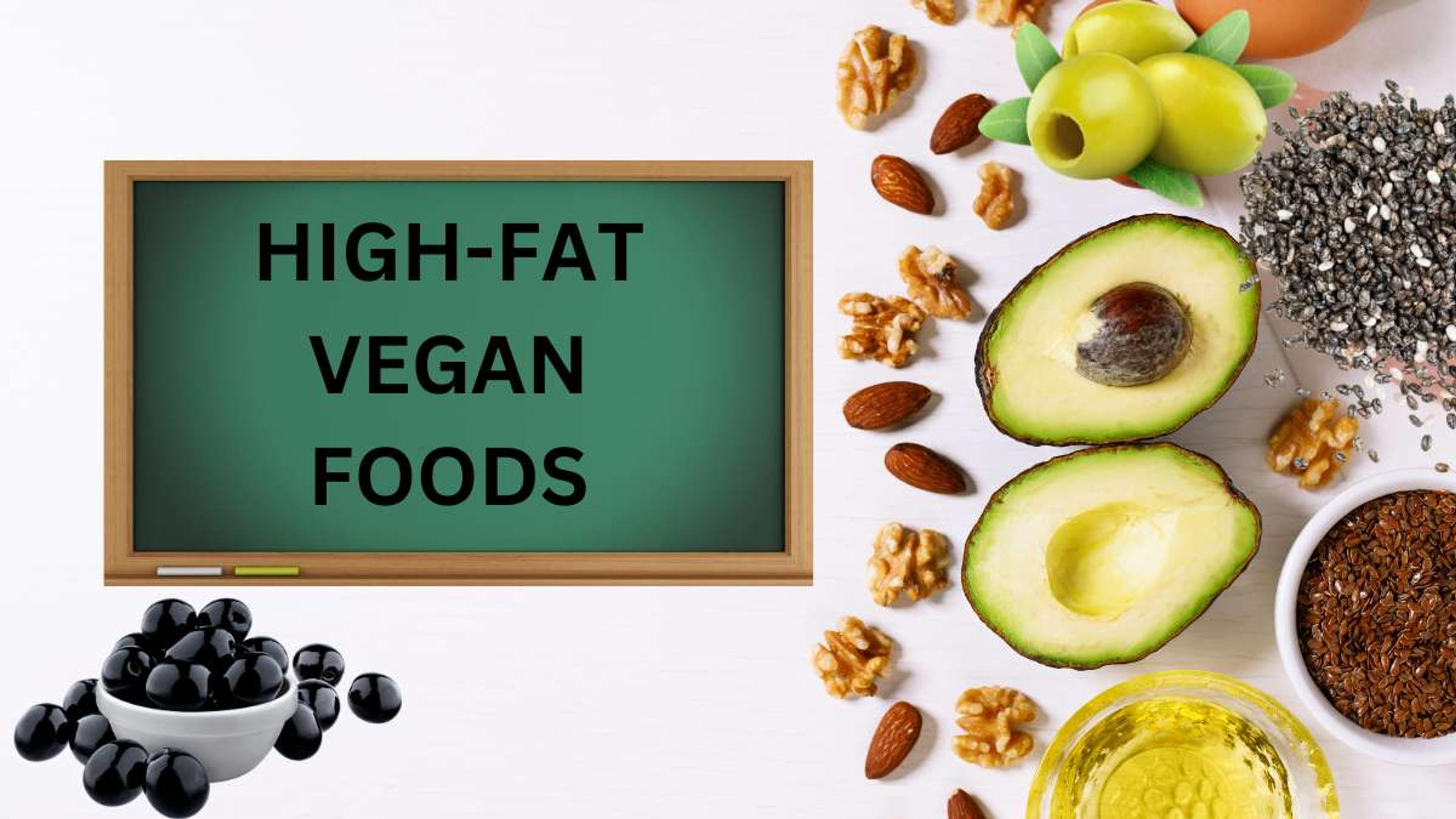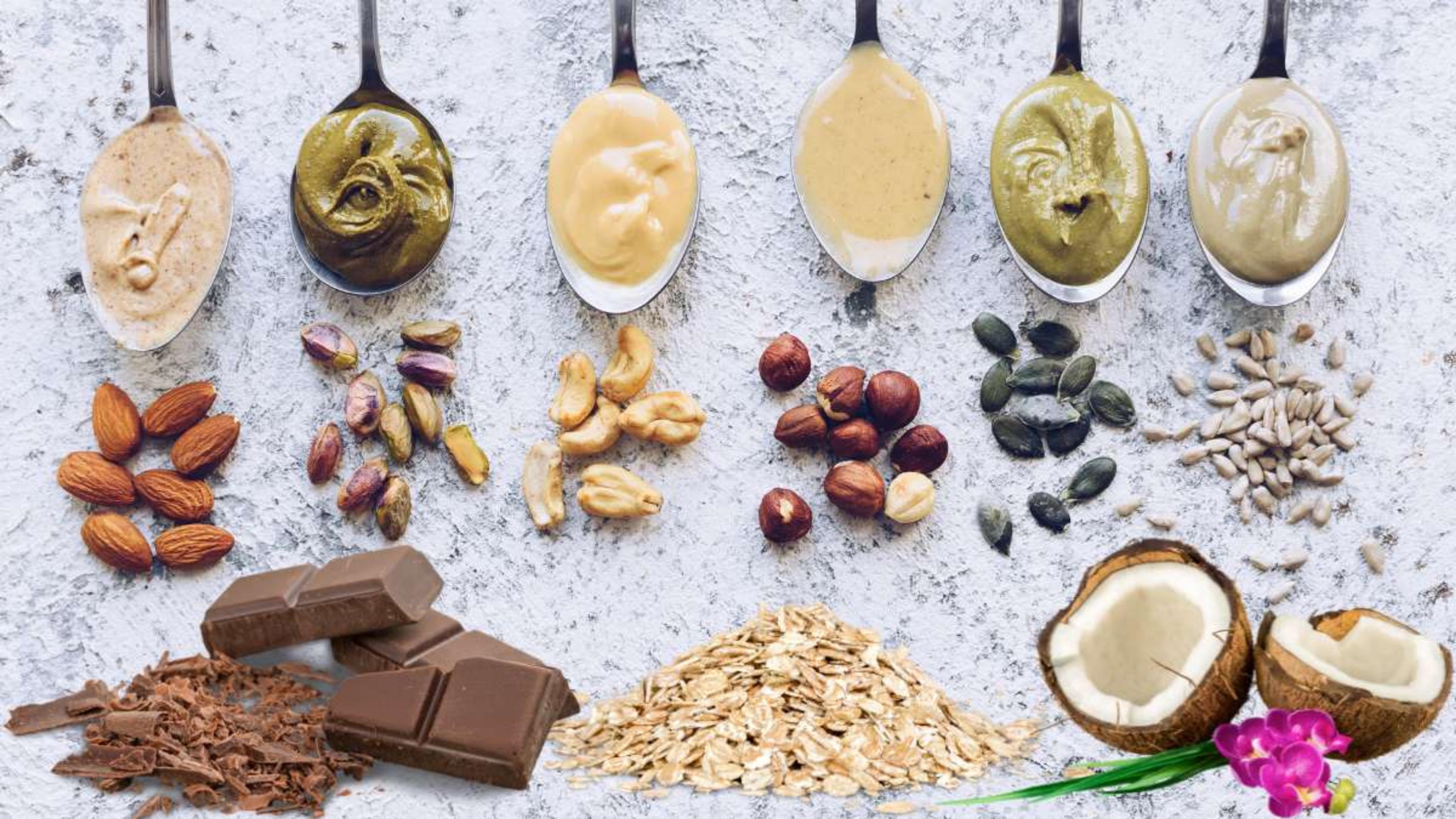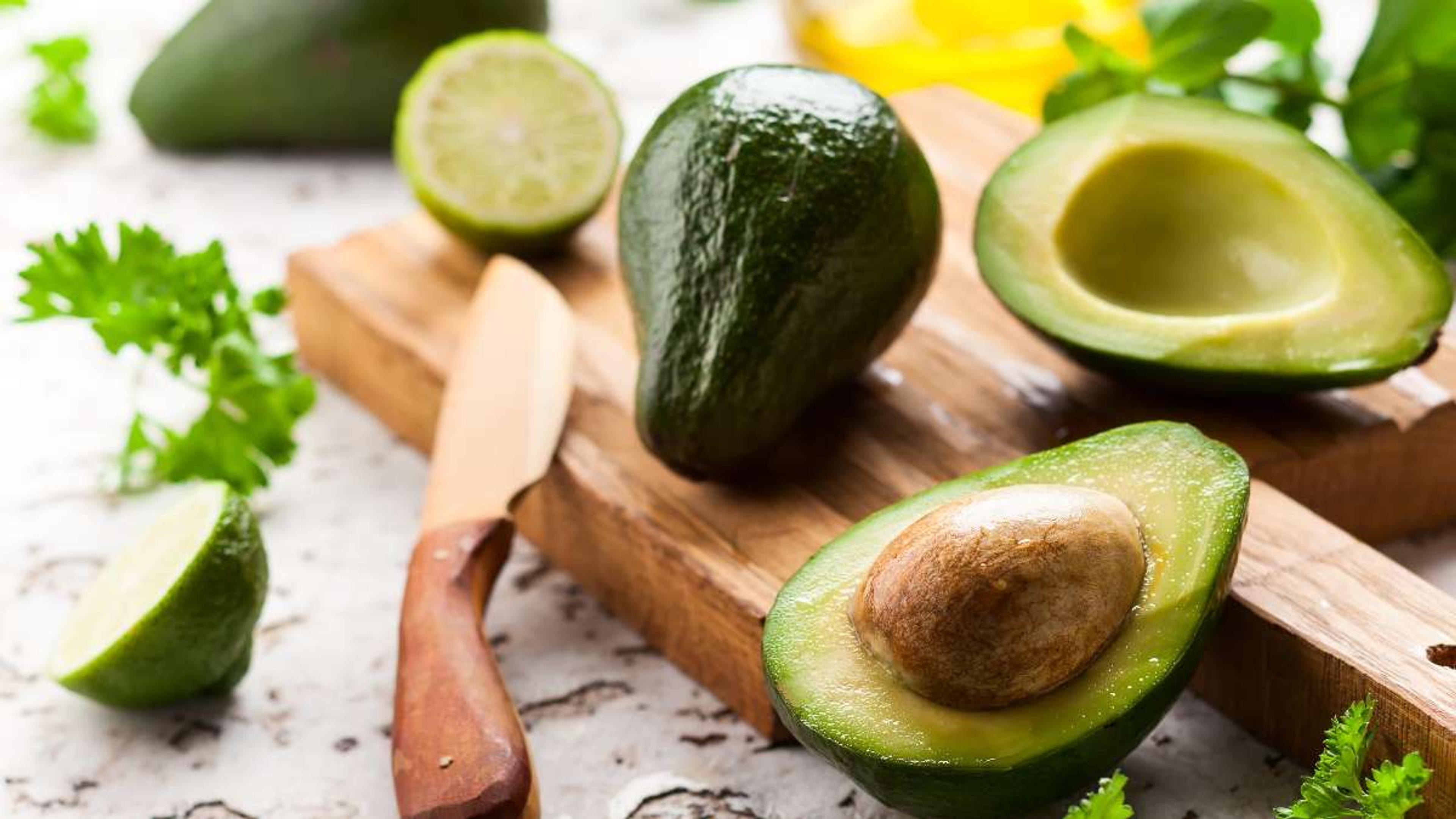Exploring Healthy High-Fat Vegan Food: A Detailed Guide

- Key Takeaways
- Foods Rich in Healthy Vegan Fats
- The Importance of Healthy Fats in a Vegan Diet
- Incorporating High Fat Vegan Foods into Your Diet
- Conclusion
- FAQs
Struggling to incorporate healthy fats into your vegan diet? You're not alone - it's a common challenge among plant-based eaters. But here's an interesting fact: many high-fat foods are actually vegan, and they provide essential nutrients that promote overall health.
In this blog post, we'll guide you through the world of high-fat vegan foods, from avocados to chia seeds, and show you ways to tastefully integrate them into your meals. Read on for fat facts that could revolutionize your diet!
Key Takeaways
- Nuts and nut butters, such as almonds and walnuts, are excellent sources of healthy vegan fats. Contrary to popular belief, incorporating nuts into your diet is not linked with weight gain.
- Chia seeds, flaxseeds, and hemp seeds are packed with vegan-friendly fats and offer omega-3 fatty acids, fiber, and essential nutrients that promote heart health.
- Avocado is a nutritional powerhouse that provides healthy fats along with essential vitamins and minerals. It can enhance cardiovascular wellness and aid in weight management efforts.
- Including plant-based oils like olive oil and avocado oil in your diet can provide essential fatty acids while promoting heart health. They add flavor to meals while boosting the nutritional value.
Foods Rich in Healthy Vegan Fats
Nuts and nut butters, such as walnuts and almond butter, are excellent sources of healthy vegan fats.

Nuts and Nut Butter
Nuts such as almonds, cashews and walnuts are high in healthy vegan fats. They provide monounsaturated and polyunsaturated fats while having a low saturated fat content. Similarly, nut butter like almond and peanut butter also offer these beneficial fats.
Contrary to common perception, incorporating nuts into your diet is not linked with weight gain according to multiple population studies. To capitalize on this nutritious food group, try plant-based butters which can be added in your meals or snacks for a healthful twist!
Seeds (chia seeds, flax seeds, hemp seeds)
Chia seeds, flaxseeds, and hemp seeds tower as the mighty trio packed with vegan-friendly fats. These tiny powerhouses contribute significant nutrition to your diet. Chia seeds offer healthy omega-3 fatty acids, fiber, and quality protein in every spoonful.
They are easy to incorporate into a variety of meals like smoothies or sprinkled on top of a toast.
Flaxseeds rival chia with their own stash of Omega-3 fatty acids while also delivering essential nutrients such as folate, vitamin B6, calcium, iron, phosphorus, and potassium. Hemp seeds add more value with significant amounts of phosphorus and magnesium.
Additionally enriched with unsaturated fats which are beneficial for heart health, these three types of seeds can be mixed into oats or used to garnish salads enhancing flavor while boosting nutritional intake.
Avocado
Packed with 22 grams of fat, the avocado is a powerhouse of nutrition. This creamy fruit boasts an impressive composition of healthy fats - about 71% monounsaturated fatty acids, 16% saturated fatty acids, and 13% polyunsaturated fatty acids.
Not only are avocados an excellent source of healthy fats for vegans but they also provide essential nutrients such as vitamins C, E, K, B6 along with riboflavin, niacin, folate and pantothenic acid.
Packed full of magnesium and potassium too; every serving delivers dietary fiber necessary for optimum health. Being nutrient-dense certainly makes avocados ideal for any plant-based diet aiming to increase their intake of healthy vegan foods.
Avocado consumption holds potential health benefits including enhancing cardiovascular wellness and aiding weight management efforts.
Olives
Olives are a fantastic addition to a high-fat vegan diet. They are not only delicious but also packed with health benefits. Olives contain vitamin E and antioxidants that can help reduce the risk of cancer, diabetes, and heart disease.
The polyphenols in olives have powerful antioxidant properties, providing further protection against oxidative stress. What makes olives even more beneficial is that they are rich in monounsaturated fats, which can lower the risk of heart disease more effectively than animal fats.
Plus, whole olives offer fiber, minerals, and vitamins alongside their healthy fats. Whether you enjoy them as a snack or use them in various recipes, incorporating olives into your diet is a great way to boost your intake of essential nutrients while satisfying your taste buds at the same time.
Plant-Based Oils
Plant-based oils, such as olive oil and avocado oil, are considered to be healthy sources of vegan fats. These oils are rich in monounsaturated fats, which have been associated with promoting heart health and reducing the risk of heart disease.
Including plant-based oils in your diet can provide essential fatty acids and beneficial nutrients. Incorporating these oils into your cooking or using them as a dressing for salads can add flavor and boost the nutritional value of your meals.
Additionally, plant-based oils like sesame oil and coconut oil offer unique flavors that can enhance a variety of dishes.
Dark chocolate & cocoa powder
Dark chocolate and cocoa powder are not only delicious treats but can also be a part of a healthy vegan diet. Dark chocolate contains less sugar than milk chocolate and is rich in antioxidants, minerals like iron and magnesium, as well as fiber.
Cocoa powder, on the other hand, is packed with fatty acids and polyphenols that promote heart health. Incorporating dark chocolate or cocoa powder into your diet can provide you with these essential nutrients while satisfying your sweet tooth.
So go ahead and indulge in some guilt-free dark chocolate or sprinkle some cocoa powder over oatmeal or smoothies for an extra boost of flavor and nutrition.
Coconut Products
Coconut products, such as coconut cream, oil, and milk, are often utilized in vegan and ketogenic recipes as healthier alternatives to traditional dairy and trans-fat-containing fats.
While coconut cream can serve as a substitute ingredient in various dishes, it is important to note that it is high in saturated fat and should be consumed in moderation. On the other hand, coconut oil is considered a healthier option when compared to butter or lard due to its composition of medium-chain fatty acids.
Additionally, coconut milk contains significant levels of saturated fat, making it a calorie-rich food choice. It's worth mentioning that coconut oil serves as a good source of lauric acid which has antimicrobial properties and may assist in reducing cholesterol levels.
Oats, Buckwheat & Quinoa
Oats, buckwheat, and quinoa are excellent choices for incorporating healthy fats into a vegan diet. These grains provide a good source of complex carbohydrates and plant-based fats.
Including oats, buckwheat, and quinoa in your meals can help maintain a balanced macronutrient intake while enjoying the benefits of healthy fats. Additionally, these grains have been linked to reducing the risk of heart disease, type 2 diabetes, hypertension, certain cancers, and obesity.
So add some oats to your breakfast bowl or try substituting rice with quinoa for an easy way to include these nutritious grains in your diet!
The Importance of Healthy Fats in a Vegan Diet
Including healthy fats in a vegan diet is crucial for essential fatty acids, improved brain function, nutrient absorption, and weight management.
Essential fatty acids (omega-3 and omega-6)
Omega-3 and omega-6 fatty acids are essential for a healthy vegan diet. These fats play a crucial role in promoting brain, eye, and immune health. Unlike other types of fats, omega-3 and omega-6 cannot be produced by the body, so it's important to include them in your diet through plant-based sources.
Good plant-based sources of omega-3 fats include vegetable oils, nuts (such as walnuts), flax seeds and flaxseed oil, as well as leafy vegetables like spinach and kale. Omega-6 fats can be found in abundance in seeds like sesame seeds and sunflower seeds, along with vegetable oils like soybean oil.
By incorporating these essential fatty acids into your vegan diet, you can ensure that you're getting the nutrients your body needs for optimal health.
Improved brain function
A vegan diet that includes healthy fats has been linked to improved brain function and cognitive abilities. These healthy fats, such as omega-3 fatty acids found in plant-based sources like flax seeds and chia seeds, are essential for brain health.
Additionally, foods rich in vitamin E, including nuts, seeds, leafy greens, and whole grains, can contribute to better brain health. By incorporating these high-fat vegan foods into your diet, you can support your brain health and enhance overall cognitive function.
Helps with nutrient absorption
Fats play a crucial role in helping the body absorb important nutrients, especially for those following a vegan diet. The presence of healthy fats in meals can enhance the absorption of fat-soluble vitamins such as vitamins A, D, E, and K.
These vitamins are essential for various bodily functions including vision, immune function, and bone health. Including high-fat vegan foods like avocados and plant-based oils in your diet can aid in nutrient absorption and ensure that you're getting the most out of your meals.
Weight management
Following a plant-based diet can be beneficial for weight management. Consuming a low-fat, high-fiber vegan diet has been found to promote weight loss and lower rates of overweight and obesity.
By incorporating healthy vegan fats into your meals, such as nuts, seeds, avocados, and plant-based oils, you can feel satisfied while still maintaining a balanced calorie intake. Additionally, a plant-based diet is typically higher in fiber and lower in saturated fat compared to animal products, which may contribute to better weight control.
Incorporating High Fat Vegan Foods into Your Diet
To incorporate high fat vegan foods into your diet, try adding avocado to your meals, incorporating nuts and seeds into salads, shakes and smoothies, and using plant-based oils in cooking and baking.
Remember to practice portion control and balance with other nutrients, or consult with a nutritionist or dietitian for personalized guidance. Discover delicious ways to increase your healthy fat intake!
Adding avocado to meals

Avocado is a versatile and nutritious fruit that can be easily incorporated into meals. Here are some ideas to add avocado to your dishes:
- Spread mashed avocado on toast for a creamy and satisfying breakfast or snack.
- Add sliced avocado to salads for extra creaminess and flavor.
- Blend avocado into smoothies for a boost of healthy fats and creaminess.
- Use mashed avocado as a healthier alternative to mayonnaise in sandwiches and wraps.
- Top soups or chili with diced avocado for added texture and richness.
- Mix diced avocado into salsas or guacamole for a refreshing dip or topping.
- Stuff halved avocados with fillings like quinoa, chickpeas, or salsa for a quick and nutritious meal.
Salads, Shakes and Smoothies
Salads, shakes, and smoothies are great ways to incorporate high-fat vegan foods into your diet. Here are some ideas:
- Add avocado slices or chunks to your salads for a creamy texture and extra healthy fats.
- Blend nut butters like almond or cashew butter into your shakes or smoothies for added protein and heart-healthy fats.
- Sprinkle chia seeds, flax seeds, or hemp seeds on top of your salads or blend them into your shakes and smoothies for a boost of omega-3 fatty acids.
- Drizzle olive oil or coconut oil as a dressing on your salads to increase your intake of monounsaturated fats.
- Use oats, buckwheat, or quinoa as a base for your salads to add fiber and healthy carbs along with some healthy fats.
Cooking and baking tips
Cooking and baking tips can help you incorporate high fat vegan foods into your diet without sacrificing taste or texture. Here are some helpful tips:
- Use plant-based oils: Substitute vegetable oils like olive oil, coconut oil, or avocado oil for butter or margarine in recipes.
- Experiment with nut butters: Spread almond butter or cashew butter on toast, add it to smoothies, or use it as a topping for oatmeal.
- Roasting nuts and seeds: Toasting nuts and seeds enhances their flavor and adds crunch to salads, stir-fries, or baked goods.
- Add coconut milk: Use coconut milk in curries, soups, or desserts for a creamy texture and rich flavor.
- Incorporate avocado: Mash avocado for guacamole, slice it onto sandwiches, or use it as a substitute for butter in baking recipes.
- Blend in tofu: Silken tofu is an excellent substitute for dairy products like cream cheese or sour cream in dips and dressings.
- Mix in chia seeds or flaxseeds: These seeds can be added to smoothies or used as an egg replacement in baking recipes.
- Try dark chocolate: Opt for dark chocolate with a high cocoa content (70% or more) to enjoy its health benefits while indulging your sweet tooth.
Portion control and balance
Maintaining portion control and balance is essential when incorporating high fat vegan foods into your diet. This helps ensure that you are meeting your nutritional needs while avoiding excessive calorie intake.
By practicing portion control, you can enjoy the benefits of healthy fats without compromising on weight management and overall health improvement. So remember to be mindful of your portions and strive for a balanced diet that includes a variety of high fat vegan foods.
Consulting with a nutritionist or dietitian
Consulting with a nutritionist or dietitian is highly recommended when incorporating high-fat vegan foods into your diet. These professionals can provide expert guidance and help you ensure that you are meeting your nutritional needs on a vegan diet.
They can assess your current eating habits, create personalized meal plans, and offer tips on portion control and balance. By working with a nutritionist or dietitian, you can make informed choices about the types of high-fat vegan foods to include in your meals while maintaining a healthy and balanced lifestyle.
Conclusion
Incorporating high-fat vegan foods into your diet can provide numerous health benefits. Foods like nuts, seeds, avocado, and plant-based oils are rich in healthy fats that support brain function, nutrient absorption, and weight management.
By adding these foods to your meals and consulting with a nutritionist or dietitian for guidance, you can enjoy the benefits of a high-fat vegan diet while maintaining a balanced and nutritious lifestyle.
FAQs
1. What are some examples of high fat vegan foods?
Examples of high fat vegan foods include avocados, nuts and seeds, coconut products, plant-based oils (such as olive oil and avocado oil), and soy products like tofu and tempeh.
2. Can consuming high fat vegan foods be healthy?
While it is important to consume a balanced diet that includes a variety of nutrients, including fats, in moderation, some high fat vegan foods can be part of a healthy diet. It is important to choose healthier sources of fats such as those found in nuts and avocados rather than relying solely on processed or fried options.
3. Are all high fat vegan foods equally nutritious?
No, not all high fat vegan foods are equally nutritious. Some may provide essential nutrients like omega-3 fatty acids or vitamin E while others may be higher in saturated fats which should be consumed in moderation. It is important to consider the overall nutrient profile when incorporating high-fat vegan foods into your diet.
4. How can I incorporate high-fat vegan foods into my meals?
High-fat vegan foods can be incorporated into meals by adding avocado slices to salads or sandwiches, using nut butters as spreads or toppings for toast and fruit, cooking with plant-based oils for sautéing or roasting vegetables, incorporating nuts and seeds into salads or oatmeal, or using tofu or tempeh as a protein source in stir-fries or curries.

